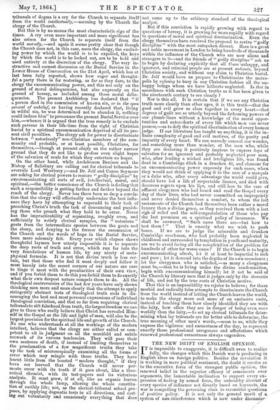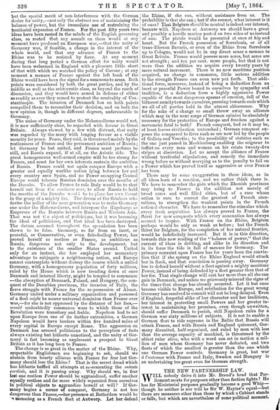THE NEW DRIFT OF ENGLISH OPINION.
I T is impossible to exaggerate, it is difficult even to realize fully, the changes which this Danish war is producing in English ideas on foreign politics. Besides the revolution it is working in mere political sentiment, the doubt it creates as to the executive force of the strongest public opinion, the renewed belief in the superior efficacy of armaments over arguments, the lamentable inclination to support every ex- pression of feeling by armed force, the unhealthy distrust of every species of influence not directly based on bayonets, the war is compelling the governing class to reconsider questions of positive policy. It is not only the general merit of a system of non-interference which is now under discussior' but the special merit of non-interference with the German desire for unity,—not only the abstract use of maintaining the balance of power, but the immediate use of restraining the territorial expansion of France. For the past fifty years two ideas have been rooted in the minds of the English governing class, so rooted that any assault on them would at any moment have produced an European war,—that the unity of Germany was, if feasible, a change in the interest of the whole world, and that any advance of France to the Rhine was to be resisted by force. At any moment during that long period a German effort for unity would have been welcomed in England with a pleasure little short of that with which we watched the policy of Cavonr ; at any moment a menace of France against the left bank of the Rhine would have been the signal for a summons to arms. Both points were considered by both the great parties, and by the middle as well as the aristocratic class, as beyond the reach of discussion, and they would have armed in defence of either as readily as ever they armed to protect the neutrality of Con- stantinople. The invasion of Denmark has on both points compelled them to reconsider their decision, and on both the new opinion is, though in different degrees, unfavourable to Germany.
The union of Germany under the Hohenzollerns would not, it is now sufficiently clear, be regarded with favour in Great Britain. Always viewed. by a few with distrust, that unity was regarded by the many with longing favour as a visible security for peace. Peace, they said, is threatened mainly by the restlessness of France and the permanent ambition of Russia ; let Germany be but united, and France must perforce be still, and Russia expand, if at all, on the Asiatic side. The great homogeneous well-armed empire will be too strong for France, and must for her own interests restrain the ambition of Russia. France could not again conquer Europe with a greater and equally warlike nation lying between her and every country save Spain, and no Power occupying Central Europe could tolerate Russian dominion over the mouths of the Danube. To allow Franco to rule Italy would be to shut herself out from the southern SCa.41, to allow Russia to hold the mouths of the Danube would be to place her own throat in the grasp of a mighty foe. The dream of the thinkers who devise the policy of the next generation was to make Germany one under the Hohenzollerns, and interpose the Hapsburgs as Emperors of the Danube between Russia and Western Asia. That was not tl e object of politicians, but it was becoming the ideal of politicians, and that ideal has been destroyed. The datum assumed throughout the speculation has been shown to be false. Germany, so far from an inert, or peaceful, or Conservative, or even fair-dealing Power, has proved herself as restless as France, as ambitious as Russia, dangerous not only to the development, but to the existence of the smaller States around. United only for an instant, she has employed her momentary advantage to subjugate a neighbouring nation, and Europe cannot contemplate without dismay the course which a united Germany, with a homogeneous population of forty millions, ruled by the House which is now treading down at once Denmark and internal liberty, might be tempted to commence —the absorption of Denmark, Poland, and Hungary, the con- quest of the Danubian provinces, the invasion of Italy, the fierce struggle with France for the re-possession of Alsace. Germany united under a military organization and possessed of a fleet might be nearer universal dominion than France ever was,—for she is not oppressed by the distance of her foes,— would undoubtedly commence wars to which those of the Revolution were transitory and feeble. Napoleon had to act upon Europe from one of its farther extremities, a German•Napoleon would have borders within five hundred miles of every capital in Europe except Rome. The aggression on Denmark has aroused politicians to the perception of facts always existing but hitherto unnoticed, and the unity of Ger- many is fast becoming as unpleasant a prospect to Great Britain as it has long been to France. The change is as great in the matter of the Rhine. Why, respectable Englishmen are beginning to ask, should we abstain from hearty alliance with France for fear lest Ger- many should lose the Rhine? That is the secret dread which has hitherto baffled all attempts at re-cementing the entente cordiale, and it is passing away. Why should we, in fear lest one restless Power should be aggrandized, suffer another equally restless and far more widely separated from ourselves in political objects to aggrandize herself at will? If Ger- many begins a career of conquest, Germany is not less dangerous than France,—her presence at Rotterdam would be -q menacing as a French fleet at Antwerp. Let her defend the Rhine, if she can, without assistance from us. The probability is that she can ; but if she cannot, what interest is it of ours? That Belgium should be neutral is indeed our interest, because with Napoleon at Antwerp we should have a great and possibly a hostile marine posted on two sides of us instead of one. The pistols would be presented at once at hip and heart. But the French possession of Sarrelouis, or of all trans-Rhenan Bavaria, or even of the Rhine from Sarrelouis up to Cologne, would not be in any direct sense a menace to Great Britain. France would possess more acres, but acres are not strength ; and ten per cent. more people, but that is not more than the addition we acquire every twenty years by mere natural increment. There is no new maritime position acquired, no change in commerce, little serious addition to the strength France can even now put forth. That addi- tional force, moreover, instead of being a deduction from an inert or peaceful Power bound to ourselves by sympathy and tradition, is a deduction from a highly aggressive Power- capable of the most dangerous spasms of emotion, full of the bitterest enmitytowards ourselves, pressing towards ends which we all of all parties hold in the utmost abhorrence. Why for the sake of a change so small throw away an alliance which may in the next surge of German opinion be absolutely necessary for the protection of Europe and freedom against a movement fatal to both? French conquest, bad as it may be at least leaves civilization untouched ; German conquest ex- poses the conquered to lives such as are now led by the people of Galicia and Venetia ; to the possibility of statutes such as the one just passed in Mecklenburg enabling the seigneur to inflict on every man and woman on his estate twenty-five stripes at discretion. Let us accept the alliance of France without territorial stipulations, and remedy the immediate wrong before us without worrying as to the penalty to fall on a Power which has proved itself as aggressive as ever France- has been.
There may be some exaggeration in these ideas, as in all ideas born of a reaction, and we rather think there is. We have to remember the gain which the Rhenish provinces may bring to France in the addition not merely of broad acres and well filled cities, but of a race whose action is sure to correct the greatest of French aber- rations, to strengthen the weakest points in the French national character. We have to remember the stimulus which every fresh acquisition has always proved to France, the thirst for new conquests which every annexation has always seemed to inspire. With France on the Rhine, Belgium perhaps would be only as weak as before ; but the French thirst for Belgium, for the completion of her natural frontier, would be indefinitely increased. But it is in this direction, towards this new reading of the balance of power," that the- current of ideas is drifting, and alike in its direction and. in its force the tide is full of menace for Germany. The primary restraint upon France has for years been the convic- tion that if she sprang on the Rhine England would attack her in flank, and that conviction is passing away. Germany has to defend herself without a fleet against a mighty maritime Power, instead of being defended by a fleet greater than that of her foe. That single change will cost her more than all she can gain in Denmark, and unless we grievously misread the signs of the times that change has already occurred. Let it but once- become visible to Europe, and retribution for the great wrong Germany has resolved to commit will not be long delayed. Even if England, forgetful alike of her character and her traditions, her interest in protecting small Powers and her greater in- terest in maintaining her promises, even though unwritten, should suffer Denmark to perish, still Napoleon rules for a German war sixty millions of subjects. it is not to enable a German fleet to ride supreme in the Baltic that Russia will attack France, and with Russia and England quiescent, Ger- many disunited, half-organized, and ruled by men with less than the average capacity of mankind, is threatened by the ablest ruler alive, who with a word can set in motion a mil- lion of men whom Germany has never defeated, and two fleets of which the smallest is greater than the one. which one German Power controls. Germany is great, but war d routrance with France and Italy, Sweden and Hungary is an undertaking too great even for German strength.































 Previous page
Previous page